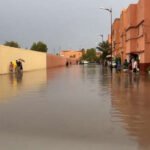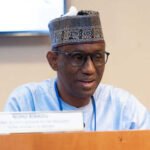The government of Nigeria received N2.3 trillion from donors to fight the Covid-19 pandemic and N288 billion for intervention programmes but only ten percent of the funds have been accounted for, BudgIT and Connected Development (CODE) have revealed.
The non-governmental organisations (NGOs) also revealed that out of the 36 states in Nigeria, 27 states do not have a breakdown of their Covid-19 expenses.
The NGOs said that they reviewed Nigeria’s current fiscal support and institutional response to the pandemic, analysed data on Covid-19 response in Nigeria, including donations, allocations, disbursements and palliative distribution processes at both the national and subnational levels.
Speaking at the Covid-19 Transparency and Accountability Project (CTAP) conference in Abuja, the country’s capital, the organisations said corruption and lack of transparency in the allocation of resources had weakened the response to the pandemic.

‘For example, as of [07 April], 2020, CACOVID, a private coalition of donors and corporate founders, has received donations totaling N21.5 [billion], according to PROSHARE’, BudgIT said in a statement.
‘Suffice it to say that the federal government has disbursed N288 billion from the N500 billion set aside for Covid-19 intervention programmes through its Economic Sustainability Plan.
‘As of the time of our report, comprehensive details of disbursed funds have not been published on the Open Treasury platform.
‘This further establishes our concerns about the lack of a proper framework for Covid-19 fund accountability in Nigeria’.

Africa’s most populous nation kicked off its response to the pandemic with the establishment of the Presidential Task Force on Covid-19 by President Muhammadu Buhari in 2020.
The task force, headed by the Secretary to the Government of the Federation, Boss Mustapha, was mandated, alongside other government agencies, to coordinate and oversee the country’s response to the pandemic.
The federal government also initiated a process to provide palliative measures, including funds disbursements and food items distribution to marginalised and vulnerable Nigerians.
‘Per our findings, the continuous mismanagement of palliative items and funds earmarked for the Covid-19 response has created a wider gap between the rich and the poor where the vulnerable and marginalised are denied access to the palliative items that rightfully belong to them’, the report noted.
Head of BudgIT’s Tracka, Uademen Ilevbaoje, disclosed other worrying findings.
‘While tracking palliative distributions, we discovered materials meant for public schools were diverted to private schools. In many states, the materials were hijacked by politicians’, he said at the conference.
What is the federal government’s response to these findings?

Nigeria’s Minister of State for Budget and National Planning, Clem Agba, who joined the CTAP panel discussion virtually, said the implementation of the economic sustainability plan (ESP) had ‘mainly been successful’.
‘The rollout and implementation of the ESP have mainly been successful because of the government’s commitment to ensuring that citizens can hold us accountable and, as such, has made efforts to ensure that all the activities under the ESP are transparent’, he said.
The minister also said that the federal government had put in place several accountability mechanisms to guarantee the proper utilisation of the funds.
These mechanisms, according to the minister, include the publication of all Covid-19-related expenditure on the open treasury portal and a post-Covid-19 audit of all related expenditure to be carried out by the Auditor General of the Federation.
BudgIT and CODE’s Follow The Money are tracking Covid-19 intervention funds in Nigeria, The Gambia, Liberia, Zimbabwe, Malawi, Cameroon, and Kenya.
Sources: BudgIT and Connected Development
Photo sources: CODE/Jide Ojediran/Stephen Akinfala Clem Agba




